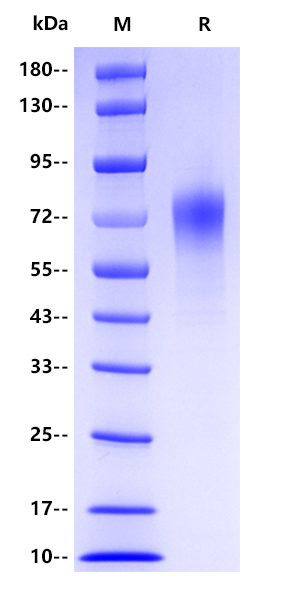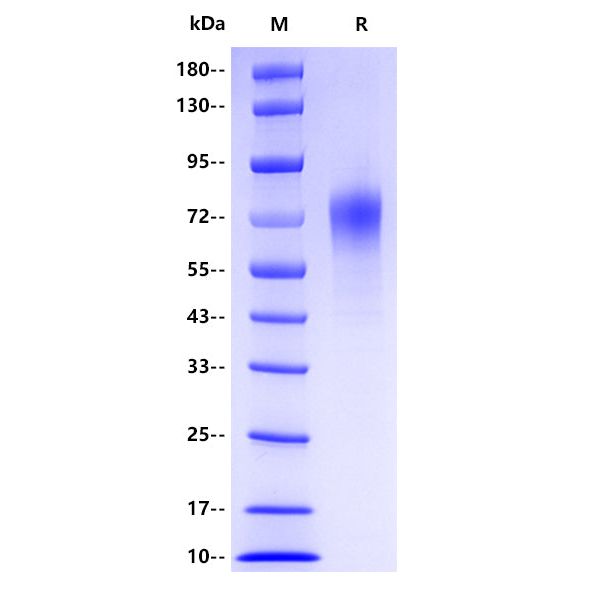RP-120_PAPP-A_Q13219
Product Details
Product Details
Product Specification
| Species | Human |
| Synonyms | Insulin-like growth factor-dependent IGF-binding protein 4 protease (IGF-dependent IGFBP-4 protease; IGFBP-4ase), Pregnancy-associated plasma protein A (PAPP-A) |
| Accession | Q13219 |
| Amino Acid Sequence | Protein sequence(Q13219, Arg81-Glu500, with C-10*His) REARGATEEPSPPSRALYFSGRGEQLRLRADLELPRDAFTLQVWLRAEGGQRSPAVITGLYDKCSYISRDRGWVVGIHTISDQDNKDPRYFFSLKTDRARQVTTINAHRSYLPGQWVYLAATYDGQFMKLYVNGAQVATSGEQVGGIFSPLTQKCKVLMLGGSALNHNYRGYIEHFSLWKVARTQREILSDMETHGAHTALPQLLLQENWDNVKHAWSPMKDGSSPKVEFSNAHGFLLDTSLEPPLCGQTLCDNTEVIASYNQLSSFRQPKVVRYRVVNLYEDDHKNPTVTREQVDFQHHQLAEAFKQYNISWELDVLEVSNSSLRRRLILANCDISKIGDENCDPECNHTLTGHDGGDCRHLRHPAFVKKQHNGVCDMDCNYERFNFDGGECCDPEITNVTQTCFDPDSPHRAYLDVNEGGGGSHHHHHHHHHH |
| Expression System | HEK293 |
| Molecular Weight | Theoretical:49.4 kDa Actual:60-80 kDa |
| Purity | >95% by SDS-PAGE |
| Endotoxin | <1EU/mg |
| Tag | with C-10*His |
| Physical Appearance | Lyophilized Powder |
| Storage Buffer | Lyophilized from a 0.2 μm filtered solution of 0.2M PBS, pH7.4. |
| Reconstitution | Reconstitute no more than 1 mg/mL according to the size in deionized water after rapid centrifugation. |
| Stability & Storage | 12 months from date of receipt, -20 to -70 °C as supplied. 6 months, -20 to -70 °C under sterile conditions after reconstitution. 1 week, 2 to 8 °C under sterile conditions after reconstitution. Please avoid repeated freeze-thaw cycles. |
Background
Pappalysin-1, also known as pregnancy-associated plasma protein A, and insulin-like growth factor binding protein-4 protease is a protein encoded by the PAPPA gene in humans. PAPPA is a secreted protease whose main substrate is insulin-like growth factor binding proteins. Pappalysin-1 is also used in screening tests for Down syndrome.PAPPA encodes a secreted metalloproteinase which cleaves insulin-like growth factor binding proteins (IGFBPs). PAPPA's proteolytic function is activated upon collagen binding. It is thought to be involved in local proliferative processes such as wound healing and bone remodeling. Low plasma level of this protein has been suggested as a biochemical marker for pregnancies with aneuploid fetuses (fetuses with an abnormal number of chromosomes).
Picture
Picture
SDS-PAGE



